|
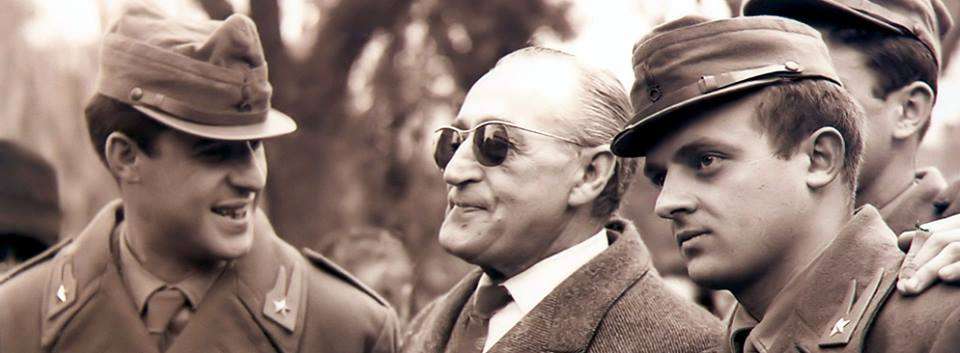
Antonio Clemente was born
on 15th February, 1898 in district Sanità n. 109 in via Santa Maria
Antesaecula, Naples.
He was born by unwed mother
Anna Clemente.According to a legend started by Totò himself his father was
Giuseppe De
Curtis son of marquis De Curtis, who always opposed to the marriage between
his noble son and the beautiful town girl.
The exuberant Totò grew up on the streets of Naples which he prefered better
than going to school.
When he finshed elementary school, he was sent to a
bording-school where he didn't even graduate to recieve a high school
diploma.
While attending the boarding-school, his nose got broken by a teacher that
was boxing playfuly with him.
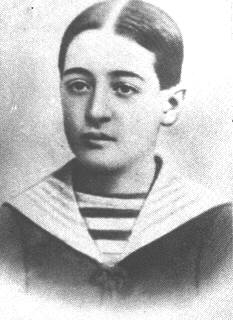 While working various jobs, he approached the theater as a simple spectator.
Some comic actors affacinated him, which he imitated perfectly. While working various jobs, he approached the theater as a simple spectator.
Some comic actors affacinated him, which he imitated perfectly.
In 1913/1914 he debuted in one of many neapolitan theaters with a pseudonym,
Clement.
It is the beginning of
the war, he enlist as a volunteer, later on he was so scared; he pretend
an heart attack and will stay behind the front line. However he will
know the hardness and the non sense of the military life.
When the war is
finished, he backs on the theatre. He start to doing the “banda” with
people such a Eduardo and Peppino De Filippo, Cesare Bixio.
Some of them
doing prose work, some composing songs and somebody else has been
dedicate to the variety show.
Antonio follow this way and he start to
gain some notoriety.
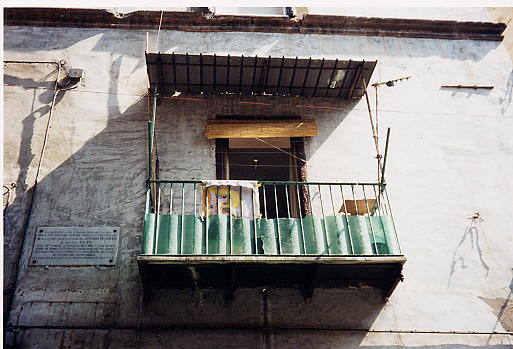 Such a combination, his
father the Marquis set about a new activity as a theatre’s agent. Such a combination, his
father the Marquis set about a new activity as a theatre’s agent.
The
new job give to him an economic independence from his family furthermore
he back to approach Anna again.
On 1921, Giuseppe’s father died and
Giuseppe get married with Anna. Antonio became Antonio De Curtis (however
the official recognition will be on 1928).
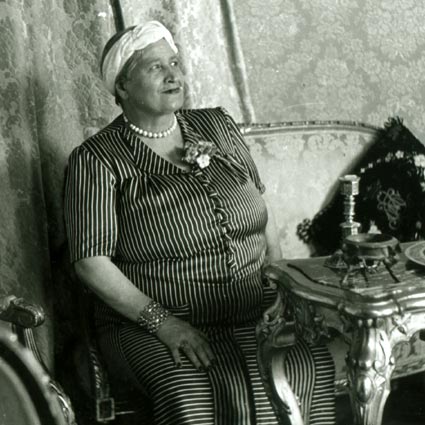 Anna and Giuseppe move
on to Rome and Antonio with them. Antonio life will get a radical change. Anna and Giuseppe move
on to Rome and Antonio with them. Antonio life will get a radical change.
After work in several small Roman’s theatres he reach to Jovinelli.
Very
quickly he became a show star he will going to travel “en tournee” all
over the Italy.
The poor years of his life they are completely finished.
His specific character is already consolidated: is the disarticulate
puppet, with the bowler, tight out of all proportion, low shoe and
colourised sock, personage which will be kept for all life.
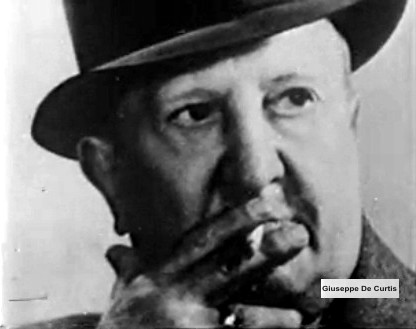 Toto’ is crazy fro women
and women are crazy for him. Toto’ is crazy fro women
and women are crazy for him.
It was famous the sofa that usually he put on
the fitting room for his guests.
Then Toto’ meet
Liliana Castagnola a café-cantant’s
famous singer, a woman with a melancholic and tragic destiny.
She was a
luring woman that fall head over hells for him; she ask Toto’ to partnered
with but, when he refused she committed a suicide on 3rd March 1931

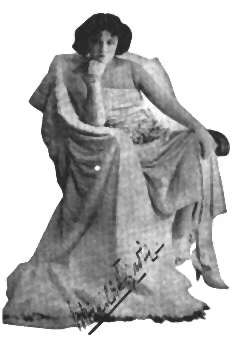 Remorse’s posthumous gather,
Toto’ lay to rest Liliana on the De Curtis family grave. Remorse’s posthumous gather,
Toto’ lay to rest Liliana on the De Curtis family grave.
After some years he
will give the lover’s name to his daughter. Few months later in Florence,
after the Castagnola’s death, Toto’
meet Diana Bandini Lucchesini Rogliani a
sixteen years old Florentine girl, who was been to watch the Toto’s show.
She didn’t find Toto’ ugly, clownish or “rolled into one bizarre way”; she
felt in love for him and she run away from home to reach him.
They are so
happy, in 1933 they get a baby girl, in 1935 the couple get a married.
Then, the actor’s
pathologic jalousie explode and became the reason in order to ask for
override the marriage in Hungary (it will be ratified in Italy on 1940).
However, despite on that, the family, in someway, stay still join until the
years ’50.
In the season 1932/33 Toto’ set up his own company, they are the
“avanspettacolo” Toto’s golden age.
People love him, and even the critic and
intellectual people grown on him.
It is the cinema growth and the set call
him: on 1937 he acting “Fermo con le mani” and two
years after ”Animali pazzi”.
 Toto’ always was living with the psychological complex of his
origins as a illegitimate child and with a never ending desire of noblesse
in his blood. Toto’ always was living with the psychological complex of his
origins as a illegitimate child and with a never ending desire of noblesse
in his blood.
About his parentage from Giuseppe De Curtis, has been
mentioned that it was uncertain, may be build from himself behind (how
Diana Rogliani use to say).
Already
in the far 1933, the marquis Francesco Maria Focas has been adopt him, and
give to Toto’ his name in return for a life interest.
When the marquis
death, Toto will became empower to use the herald title which for long time
his waiting for.
This
conquest will arrive after several years of legal argument which has been
carry out by the actor with obstinacy.
From 1945 he will get the
right to be call:
Antonio Griffo Focas Flavio Angelo, Ducas Comneno
Porfirogenito Gagliardi De Curtis di Bisanzio, Altezza Imperiale, Conte
Palatino, Cavaliere del Sacro Romano Impero, esarca di Ravenna, duca di
Macedonia e Illiria, principe di Costantinopoli, di Cicilia, di Tessaglia,
di Ponto, di Moldavia, di Dardania, del Peloponneso, conte di Cipro e di
Epiro, conte e duca di Drivasto e di Duraz.
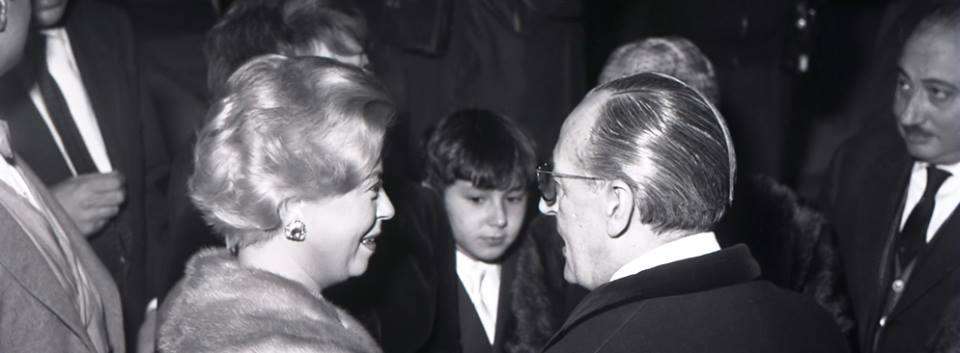
^Top
The beginning of the years ’50 has been start with success,
price (he get a Nastro d’ Argento for the film Guardie
e Ladri) but, later on, how Toto’ use to say, he get a double stab in
the back from the ex-wife Diana, who stay to rest all time, and the daughter
Liliana that couple with Gianni Buffardi, films director Carlo Ludovico
Bragaglia’ stepson, a man that Toto’ didn’t fancy ( however he will give to
the actor two grandsons and he will became the Toto’s producer for some
films).
Toto’ was alright the Liliana’s marriage had a short life
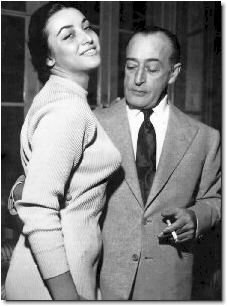 As usual
in the actor life after the cheerless will follow an happy moment. In the
1952 Toto’ meet Franca Faldini once again a
very young woman (she was 21 years old) and Toto’ felt in love. As usual
in the actor life after the cheerless will follow an happy moment. In the
1952 Toto’ meet Franca Faldini once again a
very young woman (she was 21 years old) and Toto’ felt in love.
Franca
became Toto’ fiancé but the couple, even inseparable, never get married.
Toto’ death 15th April 1967 around half past three
in the morning at his home in Rome, at the time he use to go to sleep
In seven
hours Toto’ received several hearts attack which suppress him. If the actor
was survival at the last one, probably he go to be paralysed, dumb and
completely blind.
In part Toto’ was already in this way. He
get the first heart attack just when he celebrate the result of the
electrocardiogram which, a couple of days before, the actor did it following
an illness.
The heart, just the emotional heart play a dirty tick for the
actor. A yellow-bellied betrayal.
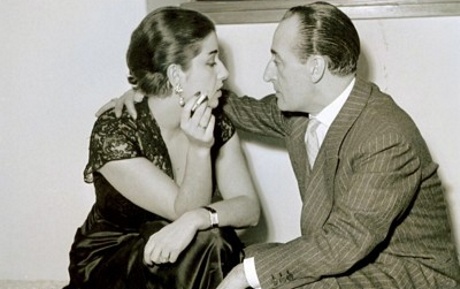 Every six months Toto’ use to make a check-up and
the doctor gush over his heart; they use to said about is heat that was a
excellent cardiac muscle, like an athlete, simple perfect. Every six months Toto’ use to make a check-up and
the doctor gush over his heart; they use to said about is heat that was a
excellent cardiac muscle, like an athlete, simple perfect.
Perhaps they had been the many cigarettes, the many daily
coffees, goodness knows, however not if never it would be waited for it, own
from he.
The 17th
April at 11:20 am he was carried in the Sant’ Eugenio church in Viale Delle
Belle Arti. On the top of the coffin they was the bowler witch the actor
started his career and a red carnation.
The ceremony was just limited and at
a simple blessing because he wasn’t married with
Franca Faldini furthermore was difficult
for the clerical authority to deal with.
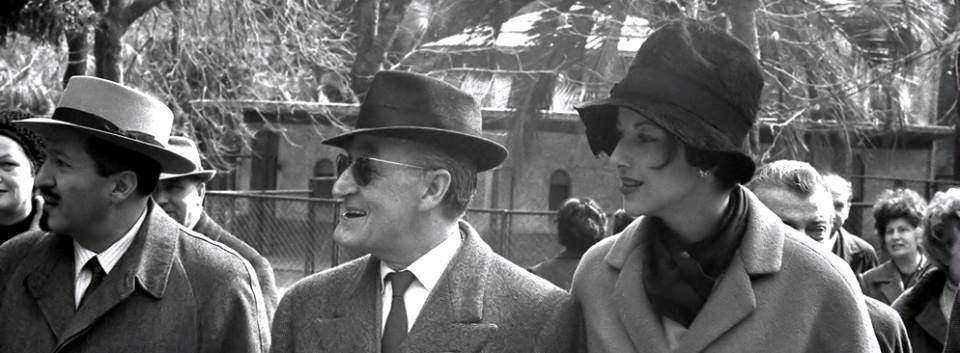
^Top
La prima infanzia
(early childhood)
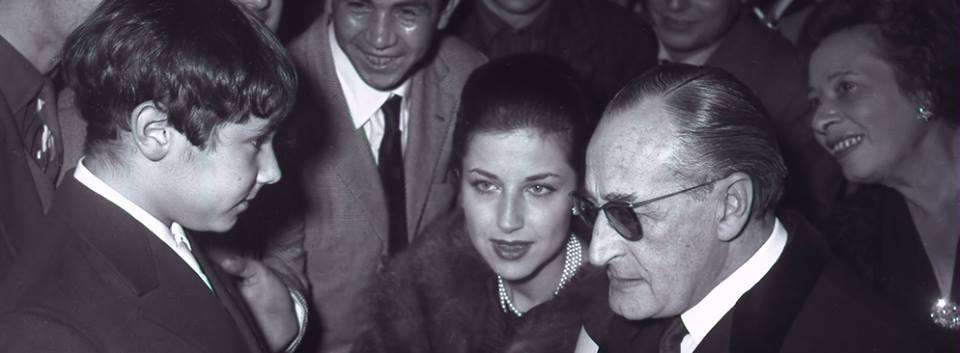
^Top
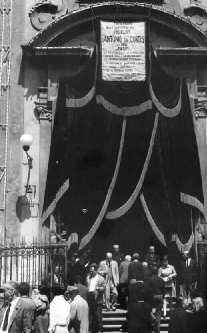 |
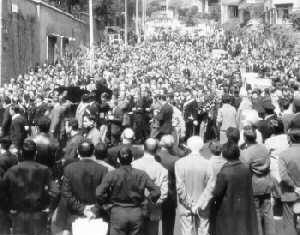 |
|
Some images of the funerals of Totò
In the Basilica del Carmine Maggiore (Naples) they attended
it approximately shakes it persons, while others one hundred thousand paused
in the immense before public square. Along applause it greeted for l' last Totò time, then the sound of lives some. |
Toto’
wasn’t in his life a particularly
religious man but, in his way, he use to believe in God. He believed in the
world’s creator and he never stopped to admire that; he didn’t accept a bad
languages about it.
He didn’t believe in the kingdom came that people
teaching you with the prayer, vice versa he said that the even and the hell
are both of them in this world.
From the kingdom came, nobody was back to
tell him how it was.
Dates and biography in brief
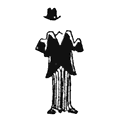 1898
15 February: in Naples, in Via S.Maria Antesecoula, in the Sanità district,
Antonio Clemente is born, son of Anna Clemente and of N.N. . He grows up in
his area, known as Totò, the name that was to become his stage name. In his
private life he has always wanted to be called Antonio. 1898
15 February: in Naples, in Via S.Maria Antesecoula, in the Sanità district,
Antonio Clemente is born, son of Anna Clemente and of N.N. . He grows up in
his area, known as Totò, the name that was to become his stage name. In his
private life he has always wanted to be called Antonio.
1915
Antonio initially does his military service in the Reggimento di Fanteria in
Livorno, but he spends a good part of this time of his conscription in
hospital for fake diseases. Between one stay or another in hospital, Totò
endures the prejudices of a corporal who will make him to coin that famous
phrase: Siamo uomini o caporali?
1916
Totò is given a job on probation without pay, by the Company of Umberto
Capece that manages the theatre Salone Elena’s: because he asked for
reimbursement of his tram fare, he was fired immediately.
1917
Totò introduces himself to the Manager, Peppe Jovinelli, holder of the
homonym roman variety theatre (founded in 1909), he suggests reproducing the
repertoire of a famous actor “eccentric fantasist” Gustavo De Marco with
which the manager had broken his relationship.
Therefore he successfully performs "Il bel Ciccillo", "Se fossi ricco",
"Paraguay".
1920
He works at Orfeo’s theatre in Naples. His most successful work is inspired
by a song, famous at that time, titled "Vipera" which he transformed in "Vicolo".
1922
Through his barber Pasqualino, Totò succeeds to enrol in the most
important roman variety theatre, Sala Umberto’s theatre. From this moment
the rise of Totò came first in variety and then revues.
 1923-25
He performs in the Triaton and San Martino theatres in Milano and at the
Maffei in Turin, having a repertoire of "Cane e gatto", "Il gagà" (revisited
later in one of his revues)," Biondo corsaro", "Otello". 1923-25
He performs in the Triaton and San Martino theatres in Milano and at the
Maffei in Turin, having a repertoire of "Cane e gatto", "Il gagà" (revisited
later in one of his revues)," Biondo corsaro", "Otello".
1924
His mother Anna Clemente and Marquis Giuseppe De Curtis (who for family
reasons had previously been unable to marry Anna) get married. He then
became the legitimate father to his son, and after accurate research, he
assumes his father’s aristocratic title of Angelo Ducas Commeno De Curtis.
From documents in the town hall in Naples he cancels the name by which he
was known, for the society, Antonio Clemente, of
Anna Clemente and N.N.
1926
He performs alongside the most famous soubrette Isa Bluettein in the
Maresca’s company; taking part in the revues "Madama Follia", " Il paradiso
delle donne", "Girotondo", "Mille e una donna".
1928
Definitive dedication to Teatro Nuovo of the Molinari’s company: Totò
performs, in the leading role in the revues and operettas "Un turco
napoletano", "O' e' Rusinella","Metteteve a ffa' l'ammore cu' mme", "I
nipoti del sindaco", "Na creatura sperduta", "Bacco Tabacco e Venere", but
above all "Messalina" (where he played the role of Caio Silio) and "I tre
moschettieri" (where he played D'Artagnan with a coat-hanger as sword and a
capon’s feather on his bowler).
1929-32
Always under the direction of the Teatro Nuovo in Napoli, Totò signed up to
the Cabiria Company and then newly arrived from the Maresca Company, on 3rd
December 1929 Totò begins a passionate relationship with the Neapolitan
soubrette
Liliana Castagnola, at that time very famous, on 3rd march 1930,
believing that Totò wanted to leave her, she killed herself by taking an
overdose of sleeping pills. Totò was very upset.
Liliana Castagnola rests in the family grave of the actor, and
instead of giving his daughter the name of his paternal grandmother, as was
tradition, he called her Liliana.
1933-40
Totò becomes head comedian of his own formation of variety and in his
repertoire we find: Era lui...si si, era lei...no no, La banda delle bambole
bionde, Il mondo è tuo, Quelli della mano verde, 50 milioni, c'è da
impazzire, Belle o brutte purchè sian donne mi piaccion tutte, La vergine
indiana, I tre moschettieri, Dei due chi sarà?, Fra moglie e marito la
suocera e il dito, Se quell'evaso fossi io.
 1935
15th April in Rome, Totò marries
Diana Rogliani. From their union Liliana is born. 1935
15th April in Rome, Totò marries
Diana Rogliani. From their union Liliana is born.
1937-66
In 1937 Totò makes his first film "Fermo
con le mani" of Gero Zambuto. From that year until 1967 he makes 97
films seen by 300 million people, a record that has no equal in the history
of Italian cinema. In 1938 he makes his second film with Carlo Ludovico
Bragaglia "Animali
pazzi", but it is with the director Amleto Palermi, in the film "San
Giovanni Decollato", taken from a Nino Martoglio comedy, that Totò shows
the measure of his possibilities as a cinematographic comic actor. The
other actors in this film with Totò are Titina De Filippo, Silvana Jachino
and Franco Coop.
1941-48
In the review theatre he forms the Totò-Michele Galdieri society, perhaps
the best Italian writer of variety shows.
The
definity success is with "Quando meno te l'aspetti" (1941), "Volumineide"
(1942), "Orlando curioso" (1942-43), "Che ti sei messo in testa" (1944),
"Con un palmo di naso" (interpreted, like other revues, with Anna Magnani in
1944), "C'era una volta il mondo" (1947), "Bada che ti mangio" (1948). In
1946-47 Totò performs in the revue "Ma se ci toccano nel nostro debole" of
Nelli, Mangini, Garinei e Giovannini.
1948
Totò takes the leading role in two comic’s films that brings him immense
popularity and becomes known as the champion of the takings: "Totò
al giro d'Italia" (the first film that, has the name of Totò in the
title, that will then be repeated in others 33 films) and "Fifa
e Arena".
1949-51
In these three years Totò makes 16 films, from "L'Imperatore
di Capri" to "Totò
cerca casa", "Totò
le mokò", "47
morto che parla", "Totò
sceicco", until "Guardie
e ladri" of Steno and Monicelli, made together with
Aldo Fabrizi, that
earned him his first <Nastro d'argento> from the Italian National
Cinematographic Journalists.
1952-56
Continue the intense cinematographic activity of Totò: of his best films we
cite "Totò
a colori",
"Un
turco napoletano",
"Miseria
e nobiltà",
"L'oro
di Napoli"
of Vittorio De Sica, "Siamo
uomini o caporali?".
1957
Totò comes down with a serious form of retinal haemorrhage that started
during a tournèe "A prescindere", that reduces his sight a lot. But he does
not lose heart and continues to make films of great success like "I
soliti ignoti", "Totò
nella luna", "La
cambiale", "I
tartassati", "Risate
di gioia" with Anna Magnani, "Il
comandante", "Operazione
San Gennaro". From the beginning of the eye disease until 1967, Totò
makes another 43 films.
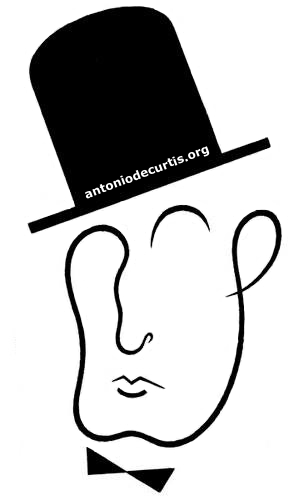 1961
A board of journalists assign the Saint Vincent the <Grolla d'oro> with the
motivation: "To the merit of the cinema, for many years having honored
inspired and the genius of the theatre of the art". 1961
A board of journalists assign the Saint Vincent the <Grolla d'oro> with the
motivation: "To the merit of the cinema, for many years having honored
inspired and the genius of the theatre of the art".
1966
The National Union of Cinematographic Journalists gave him the second <Nastro
d'argento> for his interpretation of the film "Uccellacci
e uccellini" of Pier Paolo Pasolini. For this film Totò has a special
mention at the Festival of Cannes. Pratically blind, but always full of love
for life, Totò participates in the film "Capriccio
all'italiana", in the episodes "Il mostro" and "Che cosa sono le nuvole"
of Pier Paolo Pasolini. But on 14th April he interrupts them working and on the
night of Saturday 15th he suffered a serious coronary.
1967 So
comes to an end the earthly life of one of the greatest variety actors, of
revues and of cinema, for many he is the greatest. The television
continually shows his films, followed and loved by young people,
confirmation of his extraordinary human art that renders him a unique
Italian actor, still present 33 years from his death. Totò composed a book
of poems "
'A livella" and numerous songs "C'aggia fa'!...C'aggia di!", "Miss mia
cara miss", "Nemica", "Core analfabeta", "Povero core mio" and naturally "Malafemmena",
perhaps the most famous and beautiful.
|